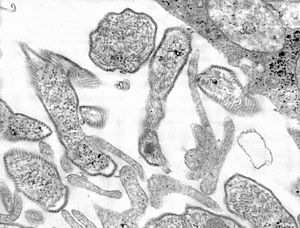Mumps facts for kids
Mumps is a viral illness that only affects humans. It spreads easily from person to person. Some common signs of mumps include a fever, headache, and a sore throat. A key symptom is swelling of the parotid glands. These glands are located near your ears and jaw.
Sometimes, mumps can lead to more serious problems. These might include hearing loss or swelling in other parts of the body, like glands or organs.
Doctors can find out if someone has mumps by testing their blood. They look for specific changes in certain substances in the blood.
The MMR vaccine helps protect people from three diseases: measles, mumps, and rubella. Getting this vaccine is the best way to prevent mumps.
Contents
What Does "Mumps" Mean?
The word "mumps" first appeared around the year 1600. It comes from an older word, "mump," which meant to make a "grimace" or a "sullen face." This name likely came from how the disease makes your face swell up. The swelling can make it hard to swallow and change your facial expressions.
In the past, "mumps" also meant feeling sad or silently displeased. Sometimes, mumps is still called "epidemic parotitis." This means a widespread swelling of the parotid glands.
Common Signs of Mumps
Mumps usually shows up in three main stages. These stages describe how the symptoms develop over time.
The first stage often has mild, general symptoms. These might include:
- a low fever
- a headache
- feeling tired or unwell
- muscle aches
- not wanting to eat
- a sore throat
In the second stage, the mumps virus spreads through the body. This is when the most common symptom appears: parotitis. Parotitis means the parotid glands become swollen and sore. This swelling usually happens about two to three weeks after someone is exposed to the virus. It typically lasts a few days, but it can sometimes last longer.
During the third stage, some people might develop more serious issues. These can include swelling in other glands or even in the brain. These more serious problems are why it's important to prevent mumps.
How Doctors Treat Mumps
There is no special medicine that kills the mumps virus directly. Instead, treatment focuses on making the person feel better and preventing serious problems.
Doctors often suggest resting in bed and drinking plenty of fluids. Eating soft foods can also help, especially if swallowing is painful. Gargling with warm salt water might also ease a sore throat.
Medicines to lower a fever can be used. However, children should not take aspirin for mumps. Aspirin can cause a serious condition called Reye syndrome in children. Pain relievers can help with aches and swelling. In very serious cases, especially if the brain is affected, special machines might be used to help with breathing.
Preventing Mumps with Vaccines
| Vaccine | Strain | Protects Against |
|---|---|---|
| MMR II | Jeryl Lynn | Measles, Mumps, Rubella |
| Morupar | Urabe AM9 | Measles, Mumps, Rubella |
| Priorix | Jeryl Lynn RIT 4385 | Measles, Mumps, Rubella |
| Trimovax | Urabe AM9 | Measles, Mumps, Rubella |
| Triviraten | Rubini | Measles, Mumps, Rubella |
| Priorix-Tetra | Jeryl Lynn RIT 4385 | Measles, Mumps, Rubella, Chickenpox |
| ProQuad | Jeryl Lynn | Measles, Mumps, Rubella, Chickenpox |
Mumps can be prevented with a vaccine. Mumps vaccines use a weakened form of the virus. This helps your body learn to fight off the real virus without getting sick.
Most countries include the mumps vaccine in their regular health programs for children. The MMR vaccine is the most common one used. It protects against measles, mumps, and rubella all at once. There is also an MMRV vaccine. This vaccine protects against measles, mumps, rubella, and chickenpox.
More than 120 countries offer mumps vaccination. However, not everyone in some parts of the world, like Africa and parts of Asia, has access to these vaccines yet.
See also
 In Spanish: Parotiditis para niños
In Spanish: Parotiditis para niños
 | Lonnie Johnson |
 | Granville Woods |
 | Lewis Howard Latimer |
 | James West |


